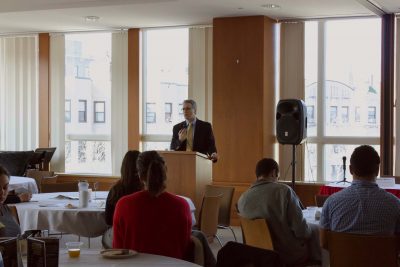
Discussion surrounding global current events took center stage at a panel April 6, as academics and professors from Boston area universities congregated with other speakers from the International Monetary Fund and the INDDEX Project to explore the dynamic field of international relations and global politics.
The Delta Phi Epsilon Gamma Chapter, an international business and foreign service co-ed fraternity that was reactivated at Boston University in 2016, hosted the panel in collaboration with the Philosophy, Politics and Economics Society and Innovate@BU. The panel, titled “Intersection: Merging Platforms on the International Stage,” took place at the Hillel House.
Maria Vallejo, a senior studying economics and international relations at BU, is the executive president of the Delta Phi Epsilon Gamma Chapter and helped organize the Intersection event.
“We wanted to go outside of our comfort zone in terms of asking people to speak,” Vallejo said. “We wanted to really use our resources because we have so many colleges around us, we wanted to be able to strive for great outreach while being able to highlight women, people of color and everyone who is striving in this industry.”
This international relations conference emphasized creating open conversations about current events and global politics. By having a diverse group lead the discussions, attendees were exposed to a greater network of people and ideas, Vallejo said.
“I believe it is such an important aspect to be able to relate to others and to be able to end up at policies that are respectful of others,” Vallejo said. “If you have a better understanding of others and a sense of respect, you will thrive in any environment.”
Tengi Shiga, a junior at BU studying political science, serves as the vice president of professional relations for the fraternity’s chapter and said the event was originally held every year in Washington, D.C., by the Alpha chapter of Delta Phi Epsilon at Georgetown University.
This is the first semester that is being held here in Boston, she said.
“We realized it was a really great opportunity to expand our role in the organization,” Shiga said.
Olivia Lewis, a freshman in the College of General Studies, said she attended because she was interested in seeing the work her fraternity had put into it.
“I wanted to experience the different panels and listen to the different things people have to say. Seeing everyone coming out to see what Delta Phi Epsilon put together is really awesome,” Lewis said. “There is a sense of community.”
Panelist Sarah Wafa, assistant researcher on the International Dietary Data Expansion Project at Tufts University, spoke about her experience with applying her understanding of other cultures to research and work.
“Diversity is important because it ensures that the platform is going to serve the global community and make sure that it is adaptable for global use,” Wafa said.
Wafa explained her role working on the INDDEX Project, which aims to tackle the scarcity of dietary data to aid food, nutrition and agricultural policy and programming, and said she saw in her field all that comes with the politics of malnutrition.
“We have famine in certain parts of the world, and overnutrition in certain parts of the world — it is political and economical,” Wafa said. “If you look at the causes of famine, it is not because there is not enough food in the world. A lot of it is political. Connecting the dots is important. Nutrition is a really big part of international development.”
Vallejo explained the panels centered around bringing many different platforms to one stage to take on the range of topics within international relations.
“The focus was on the intersection of so many different areas to form what we know as international relations,” Vallejo said. “There is not just one path, but a variety of paths that all touch and meet at a place of wanting to make a difference internationally.”
This idea of coming together to share ideas was consistent throughout the event. Wafa’s experience shared similarities with some of the other panelists.
Regina Bateson, an assistant professor of political science at MIT, spoke on the panel about the importance of having people from different backgrounds working to resolve conflicts in international politics, as well as a cultural understanding of the regions they’re working in.
“[It is vital to] not just rely on one type of person or one type of source, but to the best extent possible that we can, get a variety of perspectives to get full information,” Bateson said during the panel.
Bateson went on to talk about the importance of clear communication in international relations fields, especially when multiple organizations are involved. She said communication among different organizations and locals paves a way for positive change.
“Most problems or conflicts don’t appear out of nowhere. They existed in a smaller form before,” Bateson said in the panel. “So trying to find what was the smaller version … can involve working with people in the government, local NGOs, international NGOs and international organizations.”
After the conference, Vallejo said she hoped the audience left with better understanding of the complexities and similarities of the vast fields of international relations and global affairs.
“You can be incorporated and involved in global affairs even if you aren’t aware of it,” Vallejo said. “So many things have a domino effect and a consequence, whether that be good or bad, are incorporated in today’s global affairs.”

















































































































